Related Research Articles
Ukrainian music covers diverse and multiple component elements of the music that is found in the Western and Eastern musical civilization. It also has a very strong indigenous Slavic and Christian uniqueness whose elements were used among the areas that surround modern Ukraine.
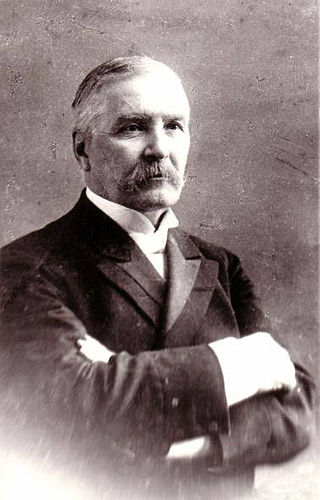
Mykola Vitaliiovych Lysenko was a Ukrainian composer, pianist, conductor and ethnomusicologist of the late Romantic period. In his time he was the central figure of Ukrainian music, with an oeuvre that includes operas, art songs, choral works, orchestral and chamber pieces, and a wide variety of solo piano music. He is often credited with founding a national music tradition during the Ukrainian national revival, in the vein of contemporaries such as Grieg in Norway, The Five in Russia as well as Smetana and Dvořák in what is now the Czech Republic.

Lesya Ukrainka was one of Ukrainian literature's foremost writers, best known for her poems and plays. She was also an active political, civil, and feminist activist.

The Kyiv Opera group in Ukraine was formally established in the summer of 1867, and is the third oldest opera in Ukraine, after Odesa Opera and Lviv Opera.
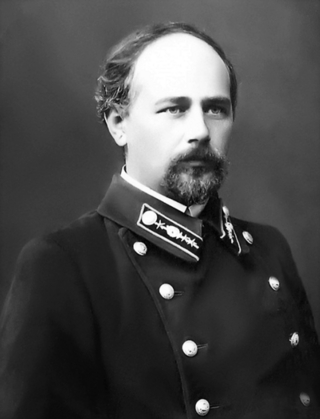
Mykola Dmytrovych Leontovych was a Ukrainian composer, conductor, ethnomusicologist, and teacher. His music was inspired by the Ukrainian composer Mykola Lysenko and the Ukrainian National Music School. Leontovych specialised in a cappella choral music, ranging from original compositions to church music to elaborate arrangements of folk music.
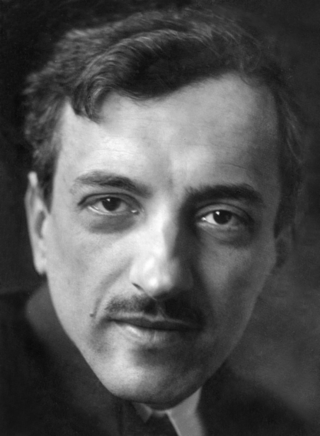
Borys Mykolaiovych Lyatoshynsky, also known as Boris Nikolayevich Lyatoshinsky, was a Ukrainian composer, conductor, and teacher. A leading member of the new generation of 20th century Ukrainian composers, he was awarded a number of accolades, including the honorary title of People's Artist of the Ukrainian SSR and two Stalin Prizes.

Kyrylo Hryhorovych Stetsenko was a prolific Ukrainian composer, conductor, critic, and teacher. Late in his life he became a Ukrainian Orthodox Priest and head of the Music section of the Ministry of Education of the short-lived Ukrainian People's Republic.

Solomiya Amvrosiivna Krushelnytska was a Ukrainian lyric-dramatic soprano, considered to be one of the brightest opera stars of the first half of the 20th century.

Natalka Poltavka is an opera in three acts by the Ukrainian composer Mykola Lysenko, based on the play Natalka Poltavka by Ivan Kotlyarevsky, first performed in 1889.
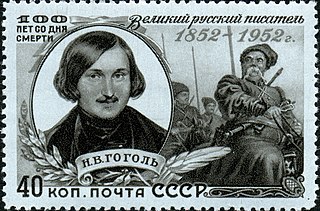
Taras Bulba is an opera in four acts by the Ukrainian composer Mykola Lysenko. The libretto was written for Lysenko by his cousin, the playwright Mykhailo Starytsky, and is based on the novella Taras Bulba, written by the Russian novelist Nikolai Gogol, himself of Ukrainian origin. The story is about a Cossack who discovers his son has betrayed his people, and kills him.
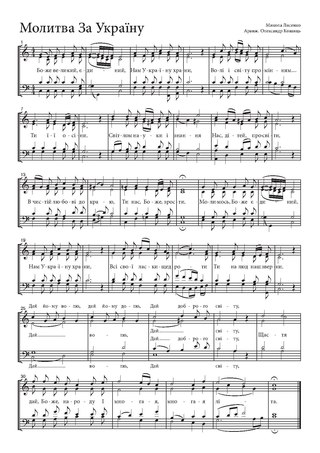
"Prayer for Ukraine" is a patriotic Ukrainian hymn published in 1885, which became a spiritual anthem of Ukraine. The text was written by Oleksandr Konysky, and the music was composed by Mykola Lysenko, first with a children's choir in mind. The song became the regular closing hymn in services of the Ukrainian Greek Catholic Church, the Orthodox Church of Ukraine and other churches. It gained national significance when it was performed by mass choirs during the Ukrainian War of Independence in 1917–1920. The hymn was intended to be an official spiritual anthem of Ukraine. It has closed sessions of oblast councils, and has been performed at major national functions.

Theater in Ukraine is a form of fine arts and cultural expression using live actor's performance in front of spectators. Ukrainian theater draws on the native traditions, language and culture of Ukraine. The first known records of Ukrainian theater trace back to the early 17th century.
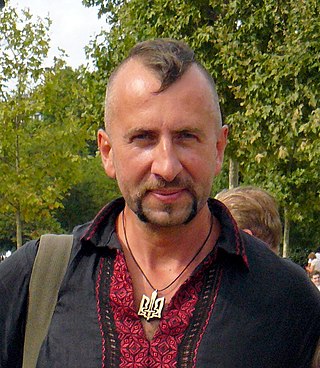
Vasyl Yaroslavovych Slipak was a Ukrainian baritone opera singer. From 1994 he frequently performed in France at such venues as Paris Opera and Opéra Bastille. For his opera performance, Slipak received several awards, including "Best Male Performance" for the Toreador Song. A volunteer in the Ukrainian army, Slipak was killed during the war in Donbas by a Russian sniper near the village of Luhanske, in Bakhmut region. He was posthumously awarded the title of Hero of Ukraine for his work as a volunteer soldier.

Irena Turkevycz-Martynec was born in Brody, Kingdom of Galicia and Lodomeria, and came to Canada, to Winnipeg, in 1949. She was a Prima donna in the Lviv Theatre of Opera and Ballet, and performed in Paris, Vienna, Berlin, Prague, and many other European cities during her long and storied career.

The Ukrainska Besida Theatre – was the first Ukrainian professional theatre in operation from 1864 to 1924. Its first performance took place in the premises of The Ukrainian National Home building in Lviv. The theatre was subsidized by the Ruska Besida Society in Lviv and occasionally supported by the Galician Diet.
Stefan Vasylovych Turchak was an outstanding Ukrainian conductor, People's Artist of the USSR (1977) and a Laureate of the Shevchenko National Prize.

The Mykola Lysenko House-Museum is one of the museums of outstanding figures of Ukrainian culture in Kyiv. It is located in the house of the teacher Mykola Gvozdik, where the Ukrainian composer Mykola Lysenko rented the 2nd floor from August 1894 to November 1912.

Koza-dereza is an opera for children in one act by the Ukrainian composer Mykola Lysenko written in 1888 and first performed in 1890 in Lysenko's home in Kyiv.

A national school of opera in Ukraine first emerged during the last third of the 19th century, and was based on the traditions of European theatre and Ukrainian folk music. The first opera by a Ukrainian composer was Maxim Berezovsky's Demofont, based on an Italian libretto, which premiered in 1773. The oldest opera in the Ukrainian musical repertoire, A Zaporozhye Cossack on the Danube by Semen Hulak-Artemovsky, was written in 1863. The composer Mykola Lysenko, the founder of Ukrainian opera, composed a number of works, including Natalka Poltavka, Taras Bulba, Nocturne, and two operas for children, Koza-dereza and Mr Kotsky.

Olha-Oleksandra Porfyrivna Bazhanska-Ozarkevych was a Ukrainian pianist, folklorist, writer, and public figure. Pen names Oksana and Olesya B.
References
- ↑ Сінькова C. (2012). "Подвижник людського духу" (PDF) (in Ukrainian). Хмельницька міська рада.
- ↑ Neef, Sigrid. Handbuch der russischen und sowjetischen Oper (in German). Henschelverlag. p. 239.
- ↑ Дмитровський Є. "Українські музиканти в передачах львівського радіо (1930—1939-ті рр.)" (PDF). Tele- Ta Radiožurnalistyka: Zbirnyk Naukovych Pracʹ [TV and Radio Journalism: Collection of Scholarly Articles] (in Ukrainian). Vol. 2012, no. 11. p. 205. ISSN 2078-1911.[ dead link ]
- ↑ "Народна оперна студія" (in Ukrainian). Міжнародний центр культури та мистецтв ФПУ.
- ↑ Царенко Ю. [Tsarenko, Yu.] (2012-03-22), Сьогодні 170 років з дня народження Миколи Лисенка – Відзначення у Львові[Today is the 170th anniversary of the birth of Mykola Lysenko - Commemoration in Lviv] (in Ukrainian), Рідна країна [Native Country]